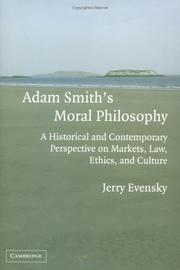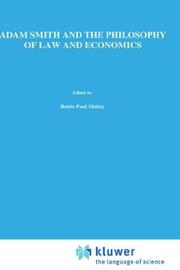| Listing 1 - 8 of 8 |
Sort by
|

ISBN: 0521852471 0521703867 1107154391 9786611113162 0511344961 0511344600 0511568231 0511610645 1281113166 051134421X 0511345305 9780521852470 9780521703864 Year: 2005 Publisher: Cambridge Cambridge University Press
Abstract | Keywords | Export | Availability | Bookmark
 Loading...
Loading...Choose an application
- Reference Manager
- EndNote
- RefWorks (Direct export to RefWorks)
Adam Smith is the best known among economists for his book, The Wealth of Nations, often viewed as the keystone of modern economic thought. For many he has become associated with a quasi-libertarian laissez-faire philosophy. Others, often heterodox economists and social philosophers, on the contrary, focus on Smith's Theory of Moral Sentiments, and explore his moral theory. There has been a long debate about the relationship or lack thereof between these, his two great works. This work treats these dimensions of Smith's work as elements in a seamless moral philosophical vision, demonstrating the integrated nature of these works and Smith's other writings. This book weaves Smith into a constructive critique of modern economic analysis (engaging along the way the work of Nobel Laureates Gary Becker, Amarty Sen, Douglass North, and James Buchanan) and builds bridges between that discourse and the other social sciences.
Smith, Adam --- Economics --- Ethics --- Teleology --- Equality --- Moral and ethical aspects --- Smith, Adam, --- Criticism and interpretation --- Business, Economy and Management --- Economics - Moral and ethical aspects --- Smith, Adam, - 1723-1790 --- Smith, Adam, - 1723-1790 - Criticism and interpretation --- Smith, Adam, - 1723-1790. - Inquiry into the nature and causes of the wealth of nations --- Smith, Adam, - 1723-1790. - Theory of moral sentiments --- Ethics. --- Teleology. --- Equality. --- Moral and ethical aspects. --- Egalitarianism --- Inequality --- Social equality --- Social inequality --- Political science --- Sociology --- Democracy --- Liberty --- Design in natural phenomena, Study of --- Final cause --- Philosophy --- Causation --- Evolution --- Necessity (Philosophy) --- Deontology --- Ethics, Primitive --- Ethology --- Moral philosophy --- Morality --- Morals --- Philosophy, Moral --- Science, Moral --- Values --- Economic theory --- Political economy --- Social sciences --- Economic man --- Criticism and interpretation.

ISBN: 9780521852470 9780521703864 9780511610646 9780511345302 0511345305 0511610645 0521852471 1107154391 1281113166 9786611113162 0511344961 0511344600 051134421X 0511568231 0521703867 Year: 2005 Publisher: Cambridge, England New York, NY Cambridge University Press
Abstract | Keywords | Export | Availability | Bookmark
 Loading...
Loading...Choose an application
- Reference Manager
- EndNote
- RefWorks (Direct export to RefWorks)
Adam Smith is the best known among economists for his book, The Wealth of Nations, often viewed as the keystone of modern economic thought. For many he has become associated with a quasi-libertarian laissez-faire philosophy. Others, often heterodox economists and social philosophers, on the contrary, focus on Smith's Theory of Moral Sentiments, and explore his moral theory. There has been a long debate about the relationship or lack thereof between these, his two great works. This work treats these dimensions of Smith's work as elements in a seamless moral philosophical vision, demonstrating the integrated nature of these works and Smith's other writings. This book weaves Smith into a constructive critique of modern economic analysis (engaging along the way the work of Nobel Laureates Gary Becker, Amarty Sen, Douglass North, and James Buchanan) and builds bridges between that discourse and the other social sciences.
Economics --- Ethics --- Teleology --- Equality --- Moral and ethical aspects --- Smith, Adam, --- Criticism and interpretation --- Equality. --- Ethics. --- Teleology. --- Moral and ethical aspects. --- Egalitarianism --- Inequality --- Social equality --- Social inequality --- Political science --- Sociology --- Democracy --- Liberty --- Design in natural phenomena, Study of --- Final cause --- Philosophy --- Causation --- Evolution --- Necessity (Philosophy) --- Deontology --- Ethics, Primitive --- Ethology --- Moral philosophy --- Morality --- Morals --- Philosophy, Moral --- Science, Moral --- Values --- Economic theory --- Political economy --- Social sciences --- Economic man --- Criticism and interpretation. --- Economics - Moral and ethical aspects --- Smith, Adam, - 1723-1790 --- Smith, Adam, - 1723-1790. - Theory of moral sentiments --- Smith, Adam, - 1723-1790 - Criticism and interpretation
Multi
ISBN: 9781107043374 9781107653764 9781107338296 Year: 2015 Publisher: New York, N.Y. Cambridge University Press
Abstract | Keywords | Export | Availability | Bookmark
 Loading...
Loading...Choose an application
- Reference Manager
- EndNote
- RefWorks (Direct export to RefWorks)
330.44 --- Adam Smith. --- Economic schools --- Smith, Adam --- Adam Smith
Book
ISBN: 1316371417 1107338298 1316365417 1107043379 1107653762 Year: 2015 Publisher: Cambridge : Cambridge University Press,
Abstract | Keywords | Export | Availability | Bookmark
 Loading...
Loading...Choose an application
- Reference Manager
- EndNote
- RefWorks (Direct export to RefWorks)
Adam Smith's The Wealth of Nations is regarded by many as the most important text in the history of economics. Jerry Evensky's analysis of this landmark book walks the reader through the five 'Books' of The Wealth of Nations, analyzing Smith's terms and assumptions and how they are developed into statements about economic processes in Book I, his representation of the dynamics of economics systems in Book II, and his empirical case for his model in Book III. With that framework in place, Evensky examines Smith's critique of alternative models, mercantilism and physiocracy, in Book IV, and Smith's presentation of the policy implications of his analysis presented in Book V. This guide highlights the nexus of Smith's economics and his work on ethics and jurisprudence, and in doing so Evensky sets his examination of The Wealth of Nations into a larger, holistic analysis of Smith's moral philosophy.
Economics --- History. --- Smith, Adam,

ISBN: 0792327969 Year: 1994 Volume: 20 Publisher: Dordrecht Kluwer
Abstract | Keywords | Export | Availability | Bookmark
 Loading...
Loading...Choose an application
- Reference Manager
- EndNote
- RefWorks (Direct export to RefWorks)
Political philosophy. Social philosophy --- Smith, Adam --- 340.11 --- 1 SMITH, ADAM --- Economics --- -Law and economics --- Economics and jurisprudence --- Economics and law --- Jurisprudence and economics --- Jurisprudence --- Economic theory --- Political economy --- Social sciences --- Economic man --- Rechtstheorie. Rechtsvinding--(algemeen) --- Filosofie. Psychologie--SMITH, ADAM --- Philosophy --- -Views on law --- Law and economics. --- Philosophy. --- 1 SMITH, ADAM Filosofie. Psychologie--SMITH, ADAM --- 340.11 Rechtstheorie. Rechtsvinding--(algemeen) --- Law and economics --- Smith, Adam, --- Law --- Economic aspects --- Views on law --- Smith, Adam, - 1723-1790 - Views on law. --- Law - Economic aspects.
Book
ISBN: 0792334256 Year: 1995 Publisher: Dordrecht : Kluwer,
Abstract | Keywords | Export | Availability | Bookmark
 Loading...
Loading...Choose an application
- Reference Manager
- EndNote
- RefWorks (Direct export to RefWorks)
Book

ISBN: 9781400873487 Year: 2016 Publisher: Princeton, NJ
Abstract | Keywords | Export | Availability | Bookmark
 Loading...
Loading...Choose an application
- Reference Manager
- EndNote
- RefWorks (Direct export to RefWorks)
Digital

ISBN: 9781400873487 9780691154053 Year: 2016 Publisher: Princeton, N.J. Princeton University Press
Abstract | Keywords | Export | Availability | Bookmark
 Loading...
Loading...Choose an application
- Reference Manager
- EndNote
- RefWorks (Direct export to RefWorks)
| Listing 1 - 8 of 8 |
Sort by
|

 Search
Search Feedback
Feedback About UniCat
About UniCat  Help
Help News
News